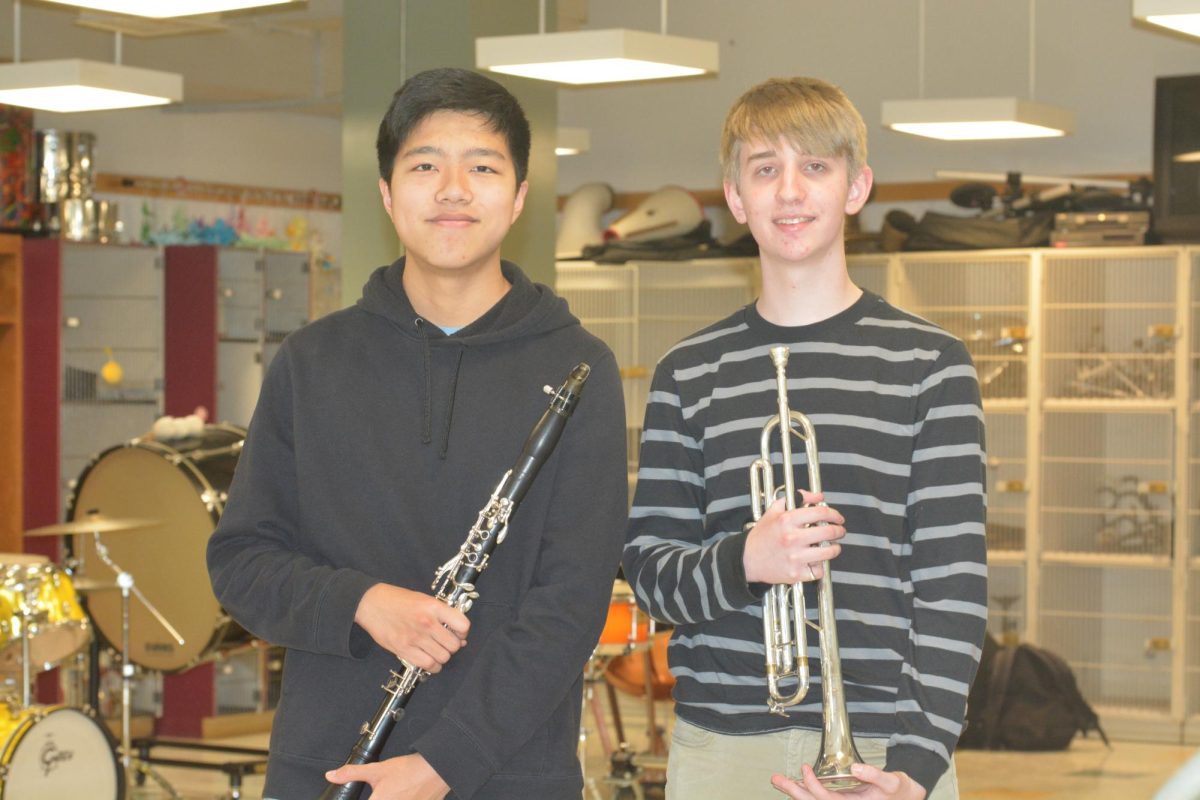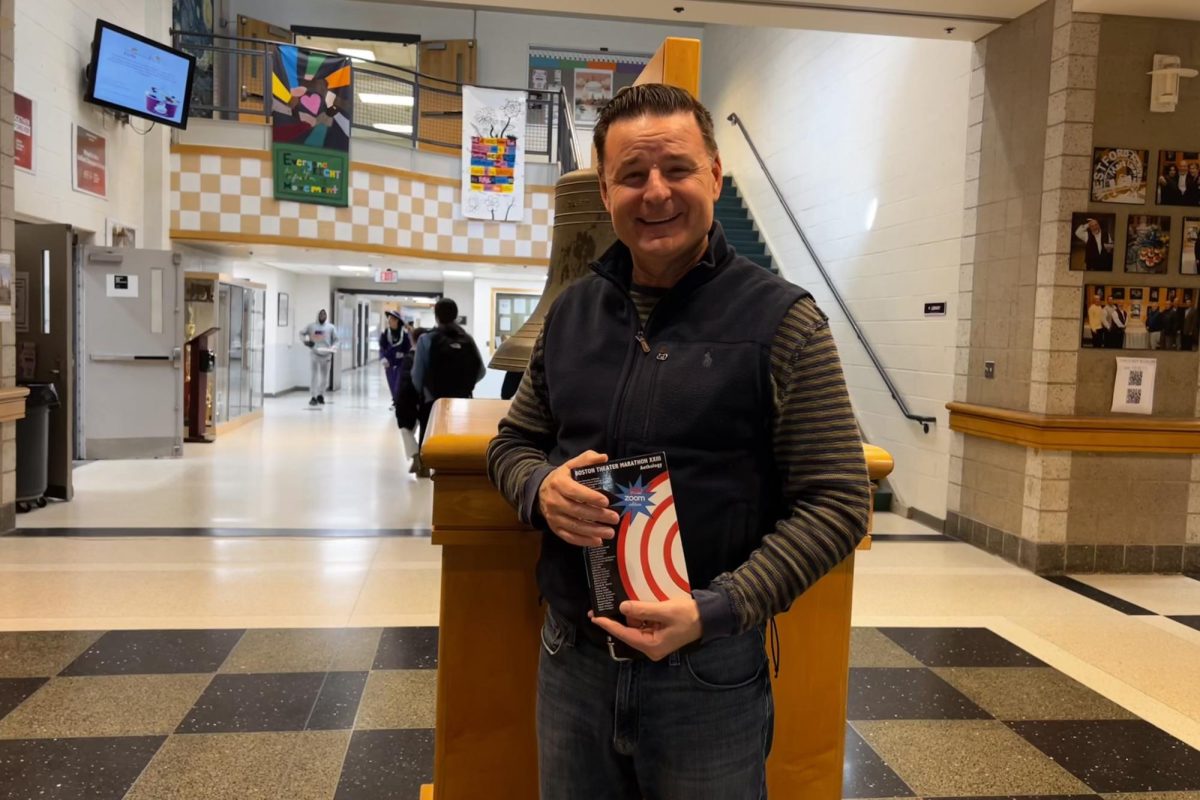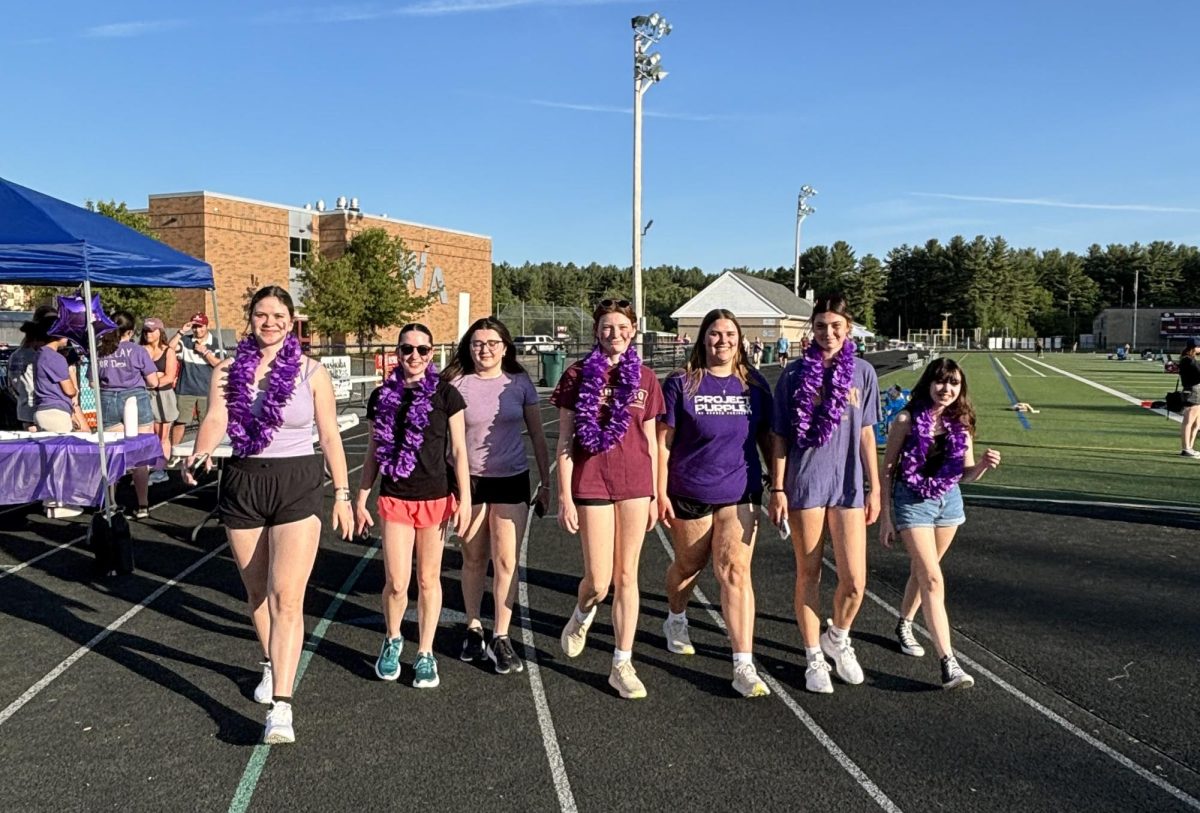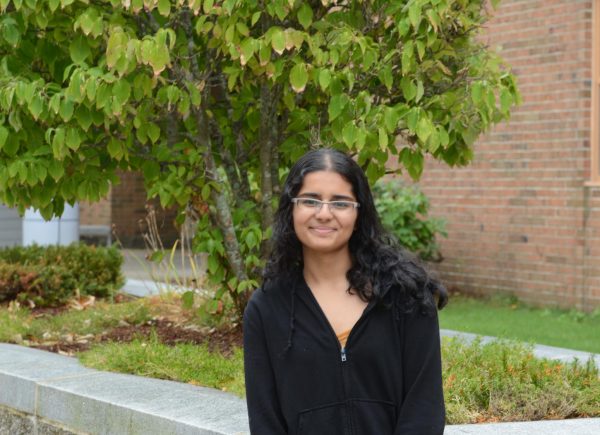Whether it’s the nostalgic tunes of childhood songs, the moving swell of an orchestra, or the excitement of a live concert, one thing is clear: the power of music is universal. And while enjoying music is simple, creating it is a different challenge altogether. Even the most determined players often find themselves struggling to learn a new instrument. Behind every seemingly effortless performance lies a musician with years of experience and hours of practice, working to perfect every note and get it just right.
It is this rare dedication to creating music that has earned Westford Academy seniors Daniel Engdahl and Luke Wang spots at this year’s National Association for Music Education (NAfME) Eastern Divisional Festival. From April 24-27, Engdahl, who plays trumpet, and Wang, who plays the clarinet, will travel to Hartford, Connecticut with the opportunity to perform alongside the country’s other top student musicians.
Selected among more than 2,000 qualifying high school musicians from across the Eastern region, they are the only WA instrumental students to have been accepted in the past several years.
“Both Dan and Luke have been foundational leaders in our program, with and without titles. They are always willing to help their peers and are among those who set the standard for excellence for our ensemble,” band director Adam Shekleton said. “[…] We are so proud of [them] for their hard work and are glad they are going to be able to represent Westford at such a prestigious event.”
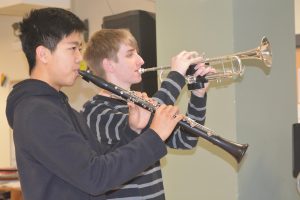
What’s more, the process of gaining eligibility to audition was almost equally as selective as the final result. Last year, Engdahl and Wang were accepted to the Massachusetts Music Educators Association (MMEA) Eastern District Festival. From there, as part of the top 50% of accepted students, they were invited to audition for the MMEA All-State Festival. After being named among the state’s most talented students at this festival, this same audition video, which included recordings of a pre-planned piece and a sight-reading test, was finally submitted to the All-Eastern Divisional Festival.
When it came to preparing for the audition last year, both musicians recall extensive practice. Engdahl, for example, spent more than three months learning and perfecting his audition piece, specifically focusing on the nuances that come with jazz music.
“It was a good audition, and it’s one I am the most proud of.” Endahl said. “[…] I obviously learned the piece and the actual notes, but as a jazz musician, most of the time was spent on learning what the chord changes behind those were and what notes fit over each chord change, and then practicing playing an assortment of notes that fit together and sound good.”
While their current skill level and passion for music may appear effortless, their journeys did not start this way. With Wang, his interest in clarinet was unexpected; in fact, it was while taking piano lessons as a third grader that he gained an appreciation for the instrument.
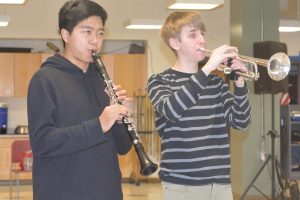
“My piano teacher’s husband played the clarinet, and when she asked if I wanted to give it a shot, I just said yes,” Wang said. “Over time, I sort of leaned toward the clarinet more because it seemed like a more interesting instrument to me and also the fact that my teacher was so good [and] that inspired me. I felt like it could become something much greater if I actually put work into it.”
On the other hand, the trumpet was always Engdahl’s instrument of choice because his older brother used to play. Despite his current love for the instrument, his initial reaction was not quite as enthusiastic.
“I really did not like playing trumpet when I started because I was terrible at it and I couldn’t figure it out. […] Playing trumpet is also a very physical thing with a lot of muscles that affect it and in a school band class with so many instruments and students, it was harder for the teacher to focus on my issues,” Engdahl said. “My parents found a local private teacher and he helped me push through the beginner barrier, and after that, I started to enjoy it a lot more.”
Private tutoring was also integral to Wang’s journey and is something he is extremely grateful for. From helping him with effective mouth posture techniques to learning how to approach fast-paced pieces, this personalized approach built both skill and confidence.
In addition to their course workload and private lessons, both incorporate daily practice, ranging from 1-3 hours, into their schedule.
“When I’m practicing, a lot goes through my mind, like what I’m messing up, what I can do better next time, and what limitations I want to put on myself,” Engdahl said. “I think about a lot intellectually when I’m practicing, but when I’m performing or auditioning, it’s a lot more of just emotion and just creating the music.”
Since his junior year, Engdahl has served as jazz band manager and a section leader for both the marching and concert bands at WA. According to WA band member Jefferey Laflamme, Engdahl’s warm character and genuine passion for music have always been evident.
“Dan is one of, if not the best, trumpet players I’ve ever worked with. He has a certain love for music that the world always needs more of,” Laflamme said. “He is not only extremely talented, but has helped me in my own musical endeavors, […] even joining me on a free gig to help a friend of mine. [He’s] truly an amazing person and musician, and [I] can’t wait to see what he does next.”
Likewise, fellow clarinet player and senior Helen Yee notes similar traits in Wang.
“He is a very talented musician and [a] great friend for sure. Even in middle school, I remember his technique was super good for his age […],” Yee said. “I think his biggest strength is his musicality and how well he can convey what a piece is trying to convey.”
Outside of school, both Engdahl and Wang have found involvement in the New England Conservatory in Boston, with Wang also playing for the Boston Youth Symphony Orchestra (BYSO) in the past. In his free time, Engdahl works with the Beantown Swing Orchestra, a paying group, and takes part in several one-off jazz and paid pop/rock gigs.
Although they benefit in slightly different ways, their favorite aspect of music is the community discovered along the way. For Wang, this often manifests itself in learning from similarly talented peers by comparing techniques. On the other hand, Engdahl finds playing with others most enjoyable.
“My favorite part is creating new music with other people,” Engdahl said. “Jazz is a communal music really, and I spend a lot of time with other musicians from all around the state and country, and playing with others is the best part.”
In the future, both hope to carry their musical passions with them, with Engdahl setting his sights on music schools, such as Oberlin and Berklee. His future goals involve becoming a jazz musician in New York and potentially transitioning into teaching music.
“Both Daniel and Luke came to WA as extremely competent and creative musicians. […],” Shekleton said. “Through their time here, they’ve [only] expanded on their aptitude to become truly creative and meaningful artists.”

